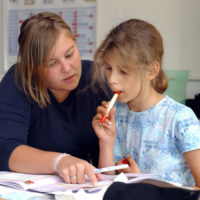Applications to Become a Teacher in the Netherlands on the Rise

The number of prospective teachers in the Netherlands is rebounding after a slump in applications to educator development programs. The highest interest of the new applicants is in geography, history, and economics, though other specialties are reporting increases too, including sciences and foreign languages. Interest in teaching some subjects had dropped by up to 33 percent in 2020. The rise in applicants comes shortly after the government cut tuition for teacher preparation in half. Salaries for teachers also increased this past summer. The government is planning to announce more measures to expand the country’s teacher corps, including incentivizing more professionals to teach part time and expanding the hours part time teachers currently work. Read more in Dutch News.
Singapore Gives Preschool Teachers Raises
Early childhood educators in Singapore’s government-supported preschools will receive a 10-30 percent increase in their salaries over the next two years, depending on their experience level, skills, and work performance. This move by the Ministry for Social and Family Development is intended to attract and retain preschool teachers as the system anticipates needing an additional 3,500 teachers by 2025. The government will also review preschool working conditions and make recommendations to support teacher well-being. In the meantime, Minister Masagos Zulkifli encouraged parents to show “more appreciation for preschool teachers” who often feel they are not adequately recognized for their efforts in nurturing children. Read more in The Straits Times.

England’s National Tutoring Program: Quality Is Inconsistent

A recent review of England’s National Tutoring Program (NTP), designed to help students catch up on learning after COVID-related school disruptions, shows the quality of the program has varied widely across schools. NTP was launched in 2020 as part of the Boris Johnson administration’s £5 billion (US$5.6 billion) of catch-up funding to schools in England. England’s school inspection office, Ofsted, found effective implementation of the tutoring scheme in just over half of the 63 schools it visited, with the remaining schools showing mixed success. Ofsted characterized programs in 10 schools as “haphazard and poorly planned.” The criteria used to assess quality included evidence of high-quality tutors with strong content knowledge, a well-constructed tutoring curriculum aligned to what is taught in the classroom, effective communication between tutors and classroom teachers, and clear assessments of student progress throughout tutoring. Ofsted found the program in general has been well received by schools and students, though critics argue that the program’s varied quality is problematic.
Ontario Moves Ahead with Catch Up Plan, Amid Drop in Provincial Test Scores
This week, Ontario Education Minister Stephen Lecce announced next steps for the province’s Plan to Catch Up for the 2022-23 school year. These included sending “math action teams” of experts to underperforming schools, new assessment tools to screen young students for reading delays, an extension of school day tutoring, payments to families to cover the costs of outside tutoring and other educational expenses, and the creation of new digital academic support tools for students and their families to use to strengthen academics, particularly math fundamentals. The announcement followed the release of the provincial assessment results for 2021-22 for grades 3, 6 and high school, which showed declines in math for all grade levels and in reading and writing at grade 3. Lecce said: “These strategic investments and initiatives will further help Ontario students get back on track and prepare them for success in the future – both inside and outside the classroom.” For more, see News Ontario.





